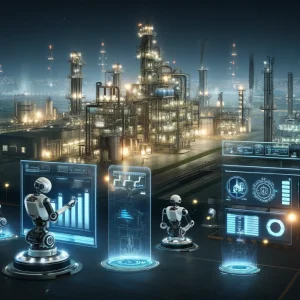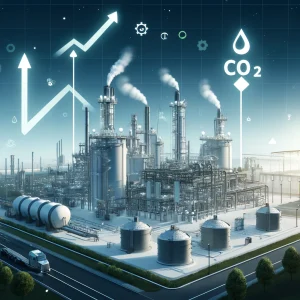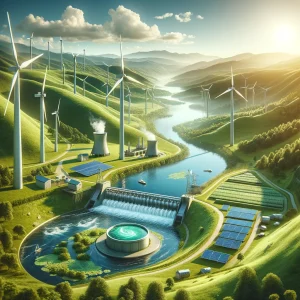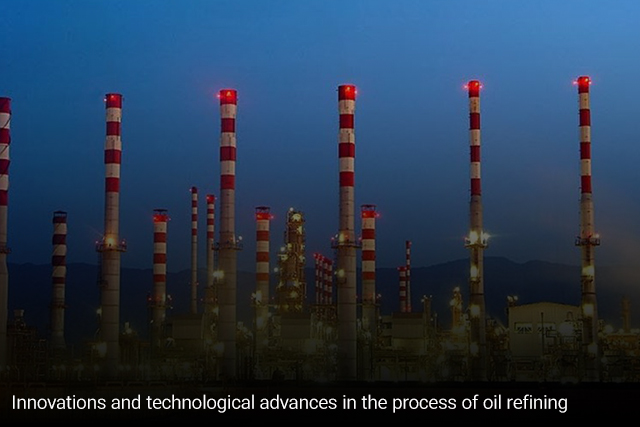The importance of the industry of oil refining
The oil refining industry is like a magical kitchen that turns crude oil into the fuels and products we use every day, from the gasoline that powers our cars to the materials in many everyday items. It keeps our world running smoothly, supports economies, and is always working on ways to do things cleaner and more efficiently.
In this article, Innovations and technological advances in the process of oil refining will be explored and discussed.
Innovations and advancements in refining technologies
Innovations and advancements in refining technologies have significantly transformed the oil industry, making processes more efficient, sustainable, and adaptable to the evolving energy landscape. Here are some key developments:
Digitalization and Automation
The integration of digital technologies, including IoT (Internet of Things), AI (Artificial Intelligence), and machine learning, has enhanced operational efficiency, safety, and reliability in refineries. Real-time monitoring and predictive maintenance models can foresee equipment failures before they happen, reducing downtime and operational costs.

Crude Oil to Chemicals (COTC)
This innovative approach aims to maximize the conversion of crude oil directly into chemicals rather than traditional fuels. Given the growing demand for petrochemicals in various industries, COTC technologies offer a promising avenue to increase profitability and meet market demands.
Carbon Capture, Utilization, and Storage (CCUS)
As environmental concerns become more pressing, refineries are adopting CCUS technologies to capture CO2 emissions and either store them underground or repurpose them for other uses, such as enhanced oil recovery or as raw materials for chemicals.
Advanced Catalysis
Catalysis plays a crucial role in refining processes. Innovations in catalyst materials and designs have led to more selective, efficient, and longer-lasting catalysts, enabling refineries to process a wider range of crude oil types and produce cleaner fuels.
Energy Efficiency Improvements
Technologies such as heat integration, advanced distillation methods, and high-efficiency equipment have significantly reduced energy consumption in refineries, lowering greenhouse gas emissions and operational costs.
Renewable Integration
Refineries are increasingly incorporating renewables into their energy mix. Solar and wind energy, for instance, are used to power operations, while bio-refineries co-process renewable feedstocks with crude oil to produce biofuels.

These advancements reflect the industry’s ongoing efforts to adapt to changing energy demands, environmental regulations, and market dynamics, ensuring its relevance and sustainability in the future energy landscape.
Stability and the Reduction of Environmental Impacts
Stability in the oil refining industry and the reduction of environmental impacts are closely intertwined goals, driven by technological advancements, regulatory pressures, and a growing public demand for sustainable practices. Achieving these objectives involves a multi-faceted approach:
Energy Efficiency
One of the primary strategies for both enhancing stability and reducing environmental impact is improving energy efficiency within refining operations. Advanced process control and optimization technologies allow refineries to consume less energy, thereby reducing greenhouse gas emissions and lowering costs.
Emission Controls
Implementing strict emission control technologies is crucial for minimizing pollutants such as sulfur dioxide, nitrogen oxides, and particulate matter. Techniques like flue gas desulfurization, selective catalytic reduction, and the use of low-emission burners help refineries meet environmental standards and reduce their impact on air quality.
Water Management
Refineries are also focusing on reducing water usage and improving wastewater treatment processes. Advanced water treatment technologies, such as membrane filtration and biological treatment methods, allow for the reuse of water within the refinery, minimizing water withdrawal from natural sources and reducing pollution.
Carbon Capture, Utilization, and Storage (CCUS)
CCUS technologies are vital for capturing CO2 emissions from refineries and either storing them underground or utilizing them in products like concrete or for enhanced oil recovery. This not only helps in reducing the carbon footprint of refineries but also contributes to the global effort to combat climate change.
Renewable Energy Integration
Incorporating renewable energy sources, such as wind, solar, and bioenergy, into refinery operations can significantly reduce reliance on fossil fuels and lower carbon emissions. Some refineries are integrating bio-refining processes that convert biomass into biofuels, further diversifying energy sources and reducing environmental impacts.
Regulatory Compliance and Sustainability Initiatives
Adhering to national and international environmental regulations is essential for refinery stability. Moreover, many refineries are engaging in sustainability initiatives, such as setting targets for reducing greenhouse gas emissions, investing in environmental protection projects, and participating in carbon trading schemes.

By focusing on these areas, the oil refining industry can enhance its operational stability while significantly reducing its environmental footprint. These efforts not only contribute to the industry’s long-term sustainability but also help in aligning with global environmental goals and societal expectations.
History of Pilsun in the Oil Industry
Pilsun, with 13 years of shining history, has been trying to satisfy its costumers by providing them with proper solutions in the industry of oil, gas and petrochemical and technical, trust-worthy equipment through all these years.
You will have a good time checking out on our website, reading articles and being posted on our latest news and events!
About the Future
The future of innovations and technological advances in oil refining is poised to revolutionize the industry, focusing on sustainability, efficiency, and adaptability to new energy paradigms. Emerging technologies such as artificial intelligence and blockchain are expected to streamline operations, enhance safety, and optimize supply chain management. The integration of renewable energy sources and the adoption of carbon capture, utilization, and storage (CCUS) technologies will address environmental concerns, aiming to drastically reduce carbon footprints. Additionally, advances in catalysis and the development of processes for converting crude oil directly into chemicals signify a shift towards producing higher-value products with lower environmental impact. The push towards digitalization, coupled with the industry’s drive to innovate, promises a future where oil refining is cleaner, more efficient, and aligned with global sustainability goals, ensuring its relevance in the evolving energy landscape.
Thank you for your time!



